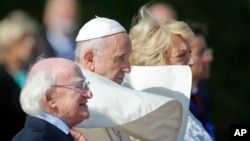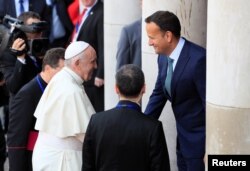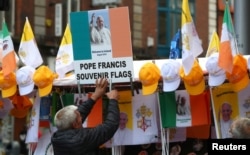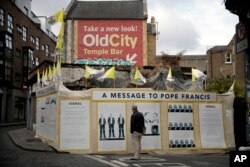Pope Francis has met for more than an hour with survivors of clerical abuse in Ireland and, by at least one account, uttered strong condemnation of members of the clergy who committed or covered up impropriety.
Paul Redmond, one of eight survivors who attended the meeting with the pope has told reporters Francis called such clergy members "caca," which translates to "filth."
The pope met with eight survivors at the Papal Nuncio's residence in Dublin. The Vatican has said it will not comment on what was discussed during the meeting, although the attendees were free to do so.
"I cannot fail to acknowledge the grave scandal caused in Ireland by the abuse of young people by members of the Church charged with responsibility for their protection and education," Francis told a state reception at Dublin Castle where some abuse survivors were in attendance.
"The failure of ecclesiastical authorities — bishops, religious superiors, priests and others — to adequately address these repugnant crimes has rightly given rise to outrage and remains a source of pain and shame for the Catholic community."
Calls for concrete action
Hundreds of thousands are expected to turn out to see the pope, but demonstrations are planned as well.
Many abuse victims, their families and supporters are calling on the pope to do more than just hold a private meeting with a select group of survivors. Protesters will gather in Dublin while the pope says Mass on Sunday, urging him to take concrete action against sex abuse.
A prominent Irish abuse survivor, Marie Collins, told a Vatican-sponsored conference on Friday that the Catholic Church must put in place "robust structures" to hold abusive clergy accountable.
“Anyone in the Vatican who would stand in the way of proper protection of children should be accountable as well,” said Collins, a former member of Pope Francis' abuse advisory board.
‘Hard to change a culture’
The Vatican's chief spokesman Greg Burke told Irish broadcaster RTE on Friday that the sexual abuse scandal is the result of a "cultural problem" that will take time to remedy.
He suggested that the pope would not be announcing specific measures during his trip.
"I think in 36 hours - or 32 hours on the ground - it's hard to change a culture," he said.
"In terms of moving to actions, that will happen. But it doesn't happen overnight … Let's first listen to the pope, and that in itself is an important part of this," Burke said.
This past week, the pope wrote a letter to the world's Catholics, stressing that “no effort must be spared to create a culture able to prevent such situations from happening, but also to prevent the possibility of their being covered up and perpetuated."
The Catholic Church is much less dominant in public life in Ireland than it once was. The country has recently voted to legalize same-sex marriage and abortion, and has put a gay prime minister in office.
Prime Minister Leo Varadkar said he is glad the church is less influential.
"I think it still has a place in our society but not one that determines public policy or determines our laws," he said.
Pope Francis' visit to Ireland was originally meant to focus on attending and closing the World Meeting of Families, which is held once every three years to discuss matters of importance to the family unit. The highlight of Francis' trip to Ireland will be an outdoor Mass in the city's Phoenix Park on Sunday, expected to draw a half-million people.
However, the latest abuse scandals around the world have shifted the focus, in part, to how the Vatican will respond to the matter.
Two U.S. cardinals -- Cardinal Sean O’Malley, the pope’s top adviser on clerical sexual abuse, and Cardinal Donald Wuerl, the archbishop of Washington -- were scheduled to attend the conference in Dublin but will be absent due to further revelations of clerical sexual abuse in America.
Another U.S. cardinal, Theodore McCarrick, was recently forced to resign due to allegations of abuse and misconduct.
Sabina Castelfranco contributed to this report.








